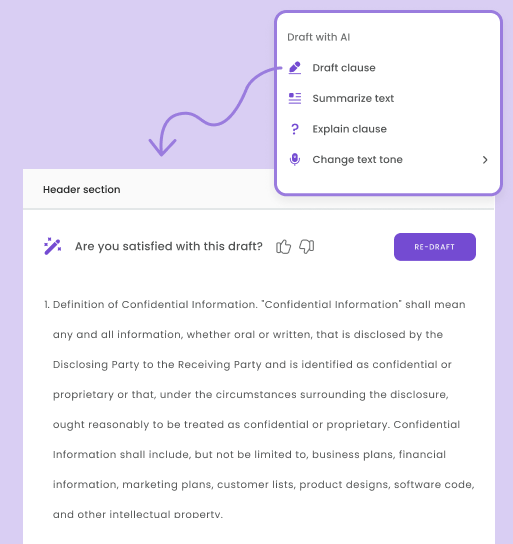In the elements of a valid contract, you’ll know that consideration is one of the most important aspects. Unilateral contracts, in a way, break this rule. Only one side offers consideration while the other side performs an act.
We understand it can be confusing at first glance.
This guide will provide you with a detailed rundown of what a unilateral contract is, the key elements, and how to use them properly.
Unilateral Contracts Explained
A unilateral contract is a legally binding agreement in which one party (the promisor) makes a promise to perform a specific act or provide a particular service, and the other party (the promisee) is not obligated to reciprocate with a promise but rather by completing the specified act.
The key characteristic of a unilateral contract is that it is contingent upon the performance of the promisee, and it becomes binding only when the promisee fulfills the required action.
Unilateral contracts are often used in situations where one party seeks a particular performance from another party without requiring anything in return, but the promisee may choose to accept the offer through their actions.
Key Elements, Including Offer and Acceptance:
- Offer: In a unilateral contract, the offer is made by the promisor. It is a promise to do something specific in exchange for the promisee’s performance of a particular act. The offer should be clear, definite, and capable of being accepted through performance. The promisor is essentially saying, “If you do this, I will do that.”
- Acceptance: Acceptance in a unilateral contract occurs when the promisee performs the requested act as specified in the offer. The promisee is not required to communicate their acceptance to the promisor in advance because their performance itself constitutes acceptance. The act must be carried out precisely as required in the offer for the contract to be formed.
- Consideration: Unilateral contracts do not require the traditional concept of consideration (something of value exchanged between parties) as found in bilateral contracts. Instead, the act of performance by the promisee is considered the “consideration.” The promisor’s promise is the inducement for the promisee’s performance.
Real-World Examples Illustrating Unilateral Contracts:
- Reward Offers: A common example of a unilateral contract is a reward offer. If someone loses their pet and offers a reward for its safe return, anyone who finds the pet can choose to accept the offer by returning the pet. The person who made the offer is obligated to pay the reward only if the pet is returned, making it a unilateral contract.
- Contest or Sweepstakes: Many contests and sweepstakes operate on the principle of unilateral contracts. Participants may be required to perform an action, such as submitting an entry or solving a puzzle, in exchange for the chance to win a prize. The promise to award the prize is binding only if the participant successfully fulfills the specified task.
- Performance-Based Contracts: In some contracts, payment is contingent upon the completion of specific services or tasks. For instance, a company might offer a bonus to employees who achieve a certain sales target. If the employee reaches the target, the employer is obligated to pay the bonus.
- Lost Property Advertisements: If someone loses a valuable item and advertises a reward for its return, anyone who returns the lost property under the conditions mentioned in the offer creates a unilateral contract. The person who made the offer is bound to provide the reward upon the return of the item.
Unilateral contracts are prevalent in everyday life, and they demonstrate that not all contracts require reciprocal promises. In these contracts, acceptance is not communicated but is instead realized through performance, which triggers the promisor’s obligation to fulfill its promise.
Key Features of Unilateral Contracts
Promisor and Promisee Roles: In a unilateral contract, there are two distinct roles: the promisor and the promisee. The promisor is the party making the promise, offering to perform a specific act or service in the future. The promisee, on the other hand, is the party to whom the promise is made.
The promisee is not required to provide any reciprocal promise, but rather, their role is to fulfill the condition set by the promisor. The promisor is obligated to fulfill their promise only if the promisee completes the specified act. This one-sided nature of the contract is a defining characteristic of unilateral contracts.
The Requirement of Performance for Acceptance: One of the fundamental aspects of a unilateral contract is that acceptance occurs through performance. Unlike bilateral contracts, where acceptance is typically communicated through an explicit promise, in a unilateral contract, the promisee accepts the offer by performing the specific act or task as outlined in the offer.
The act of performance is not just evidence of acceptance but is, in fact, the acceptance itself. Once the promisee fulfills the condition, the contract becomes binding, and the promisor is then obligated to fulfill their promise.
How Unilateral Contracts Differ from Bilateral Contracts: Unilateral contracts differ from bilateral contracts in several ways. In a bilateral contract, both parties make promises to each other, creating reciprocal obligations. Each party is both a promisor and a promisee. Acceptance in a bilateral contract typically involves one party’s promise being met with another party’s promise, forming a mutual agreement.
However, in a unilateral contract, only one party (the promisor) makes a promise, while the other party (the promisee) is not required to reciprocate with a promise but rather with performance. The distinction is crucial: in bilateral contracts, acceptance is a two-way communication of promises, while in unilateral contracts, acceptance is achieved through the act of performance by the promisee.
In summary, the key features of unilateral contracts include the roles of the promisor and promisee, the requirement of performance for acceptance, and the contrast with bilateral contracts, where both parties make promises to each other. Understanding these features is essential when dealing with contracts that involve one-sided obligations based on the completion of a specified act.
Benefits of Unilateral Contract
Flexibility and Reduced Risk for the Promisor: Unilateral contracts offer a significant advantage of flexibility to the promisor. Since the promisor is the party making the promise without requiring anything in return until the promisee performs the specified act, there is reduced financial or contractual risk.
The promisor is not bound to fulfill their promise unless the promisee completes the action, which means that the promisor can avoid unnecessary obligations and expenses if the condition is not met.
This flexibility is particularly advantageous in situations where the outcome is uncertain, and the promisor doesn’t want to commit to an obligation until a specific event or action occurs, minimizing financial exposure.
Encouraging Specific Actions or Performance: Unilateral contracts are an effective tool for encouraging specific actions or performance. They serve as incentives for individuals or entities to act in a certain way or achieve specific goals.
For example, a company may offer a bonus to employees for reaching a sales target, thus motivating them to put forth additional effort. This feature of unilateral contracts can drive results, as the promisee has an opportunity to gain a benefit by completing the action or task set by the promisor.
This can be particularly useful in various contexts, such as contests, rewards, and performance-based compensation.
Case Studies Showcasing Successful Use of Unilateral Contracts: There are numerous real-world case studies that showcase the successful use of unilateral contracts. For instance, companies often utilize unilateral contracts in sales incentives, where bonuses or commissions are only paid out to sales representatives if they achieve certain targets.
Additionally, lost property advertisements offering rewards demonstrate the effectiveness of unilateral contracts as they motivate individuals to return lost items. In the realm of contests and sweepstakes, businesses use unilateral contracts to motivate participation, with individuals entering for the chance to win prizes through their performance, such as solving a puzzle or submitting an entry. These case studies illustrate how unilateral contracts drive desired actions and outcomes.
Unilateral contracts offer a range of benefits, including flexibility and reduced risk for the promisor, as well as the ability to encourage specific actions or performance by the promisee. Real-world case studies in various contexts demonstrate the effectiveness of unilateral contracts in motivating individuals or entities to fulfill specified conditions, ultimately resulting in favorable outcomes for both parties involved.
Using a Unilateral Contract Properly
There are a few things to consider when taking advantage of a unilateral contract. This will ensure they’re being used the right way and you’re not accidentally circumventing laws and requirements.
Clear and Precise Offer Terms: establish clear and precise offer terms. The offer should be unambiguous and specific, outlining the exact act or task that the promisee needs to perform to accept the offer.
Ambiguity in the offer can lead to confusion and disputes. Therefore, it’s crucial to articulate the conditions for acceptance in a manner that leaves no room for interpretation. Clarity in the offer ensures that both parties understand their respective roles and obligations.
Defining the Conditions for Acceptance: Defining the conditions for acceptance is a critical aspect of utilizing unilateral contracts properly. The promisor must clearly specify the criteria that the promisee needs to meet for acceptance.
It’s important to detail the required action, the timeline within which it must be completed, and any other relevant terms. The promisee should have a clear understanding of what they need to do to trigger the promisor’s obligation.
Failure to define these conditions precisely can result in disputes and disagreements about whether acceptance has occurred.
Avoiding Common Pitfalls and Misconceptions: One common misconception is that acceptance requires the promisee to communicate their intention to accept the offer before performing the act. In reality, the act of performance itself constitutes acceptance in a unilateral contract, and formal communication of acceptance is not required.
Additionally, promisors should avoid attempting to revoke the offer after the promisee has begun performing the specified act, as revocation may not be valid once performance has commenced. It’s crucial to understand the legal principles governing unilateral contracts to prevent misunderstandings and disputes.
Properly using unilateral contracts involves establishing clear and precise offer terms, defining the conditions for acceptance with clarity, and being aware of common pitfalls and misconceptions. When crafted and executed correctly, unilateral contracts can serve as effective tools for motivating specific actions or performance by the promisee, leading to mutually beneficial outcomes for both parties.
Ethical and Responsible Use of Unilateral Contract
Ensuring Fairness and Transparency: It’s paramount to use unilateral contracts in an ethical and responsible manner, which includes ensuring fairness and transparency in the process. The terms and conditions of the contract should be clear, easily understandable, and not designed to mislead or confuse the promisee.
Promisors should avoid hidden or ambiguous clauses that could lead to unexpected obligations. When offering incentives, such as rewards or bonuses, the criteria for acceptance should be reasonable and proportionate to the promised benefit. Transparency in the terms and conditions allows the promisee to make an informed decision and fosters trust in the agreement.
Avoid Undue Influence or Coercion: Promisees should not be pressured or manipulated into performing the specified action to accept the offer. Promisors should refrain from tactics that might unduly compel promisees to comply.
It’s essential that promisees act voluntarily and with a genuine choice, free from duress or manipulative tactics. Ethical behavior requires respecting the autonomy and free will of the promisee.
Ethical Considerations in Various Scenarios: Ethical considerations are crucial in various scenarios where unilateral contracts are employed:
- Employment Contracts: Employers should ensure that performance-based compensation, such as bonuses or commissions, is based on achievable and reasonable targets. Unrealistic or unattainable goals could lead to employee frustration and ethical concerns.
- Rewards and Incentives Programs: Businesses offering loyalty rewards or incentives must ensure that the conditions for acceptance are transparent and attainable. For example, they should not create overly complex redemption processes that make it difficult for customers to access their rewards.
- Contests and Competitions: Organizers of contests and competitions should establish fair and equitable criteria for winning. They should also prevent fraudulent practices or attempts to manipulate the outcome. Contest rules should be clear and consistent.
- Everyday Life: Individuals offering rewards in lost and found notices should honor their commitments and not renege on promises once the conditions are met. This upholds their ethical responsibility and maintains trust in the process.
Ethical and responsible use of unilateral contracts requires careful consideration of fairness, transparency, and the avoidance of undue influence in various contexts. When employed with ethical integrity, unilateral contracts can serve as positive motivators for desired actions and foster trust between promisors and promisees.
Conclusion
Unilateral contracts are an effective way to provide an appropriate incentive only when a task is completed. It doesn’t require explicit acceptance by the promissee but the promisor needs to honor the contract when the promise fulfills their end of the bargain.
It can be used in many ways as outlined in this guide. Be sure to use the information contained here to use unilateral contracts the right way and don’t forget to share.




